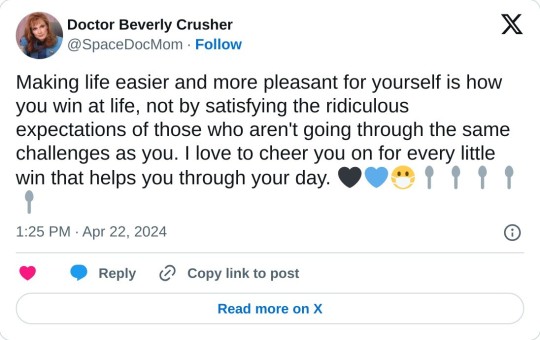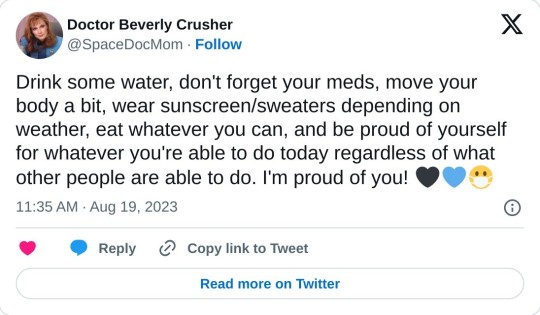#adaptability
Text

Doctor Beverly Crusher
@SpaceDocMom
Making life easier and more pleasant for yourself is how you win at life, not by satisfying the ridiculous expectations of those who aren't going through the same challenges as you. I love to cheer you on for every little win that helps you through your day. black heart, blue heart, masked, spoon x5
2:25 PM · Apr 22, 2024
#star trek#doctor crusher#star trek the next generation#star trek memes#star trek tng#kindness#support#care#compassion#spoons#spoonies#adaptability#chronic illness#disability
20 notes
·
View notes
Quote
What cannot man live through! Man is a creature that can get accustomed to anything, and I think that is the best definition of him.
Fyodor Dostoyevsky, The House of the Dead
911 notes
·
View notes
Text
We can change, evolve, and transform our own conditioning. We can choose to move like water rather than be molded like clay.
Terry Tempest Williams, When Women Were Birds: Fifty-four Variations on Voice
189 notes
·
View notes
Text
“What stands in the way becomes the way.”
— Marcus Aurelius
122 notes
·
View notes
Text
[ SEDUCTION SERIES ] OBSERVE AND PLAY YOUR CARDS ACCORDINGLY
We are multifaceted being with different qualities. Don't put yourself in a box by thinking you have to be one way all the time. Explore other areas of your personality and become well rounded. Being in touch with your many different qualities broadens your audience and helps you relate to a variety of different people. This adaptability is an admirable trait to have and is crucial in seduction. Sometimes you will need to be sociable and at other times quiet. Sometimes you will need to be hot and at others times cold.
The Joker
Learn to wear different masks to fit any situation. Be like the Joker card, able to shapeshift and change into what is needed to win the game.
Goddesses/Gods
Goddesses/Gods are written as shapeshifters meaning they could embody different characteristics when they needed to.
For example, the Egyptian Goddess Bast was known to have different forms such as Sekhmet and Hathor.

#succulentsiren#writers and poets#patreon#shapeshifter#shapeshifting#joker#god#gods#goddess#bast#sekhmet#hathor#het heru#baset#ancient egypt#egyptian gods#divine feminine#affirmations#seduction#the art of seduction#dark femininity#femininity#dark feminine energy#the joker#villian era#cards#spades#adaptability#variety#personality
40 notes
·
View notes
Text
Re-invent yourself as many times as you need to. You are always a work in progress.
#growth#change#evolution#potential#selfdiscovery#creativity#exploration#progress#adaptability#empowerment
61 notes
·
View notes
Photo

58 notes
·
View notes
Text
Anon wrote: I'm an ENFP, I'm 30 years old and I’m really needing to work on my self-confidence for me and for dealing with people. I’ve read in our blogs some posts that reinforce the importance of developing skills to have confidence. I think it's very legitimate.
In this process of learning new things, I often find myself in great difficulty and my inner child agonizes with insecurity. I look at friends who have confidence in themselves as something natural: confidence that they will learn, confidence in themselves, but unfortunately I am very unstructured (poor growth environment, without incentives), so I have a lot of difficulty trusting myself: especially being so inexperienced, clumsy and slow to learn everything.
What gets worse is being in environments where people don't have patience with beginners. Like now I'm living in a foreign country where people are very rude in the workplace. This hurts me a lot, because I have problems asserting myself and being respected. I discovered that they need rudeness to respect others. How to deal with this? Would I be able to impose myself without getting nervous and acting rude (as they usually have to do)?
And more, how can we learn from this situation? How can I be truly confident and also how can I simply demonstrate more confidence to make myself respected? I'm tired of conveying weakness. People don't value my sweetness it's not a good tool for me right now. How to develop self-confidence, at least start to demonstrate a little confidence and boundaries! And in the midst of this, the most important thing: how do you deal with such unpleasant people? Especially me being used to being such a sweet, "silly" person, always with my guard down, calm and considered weak by others.
---------------------
You seem to be talking about two issues that need unpacking separately: 1) personality, and 2) confidence.
You're having a personality clash with the people at work. Analytical psychology posits that personality clashes are disturbing because they remind you of negative things in yourself you dislike, so there is a need to go within to see what's really happening.
To be clear, I'm not denying that toxic people/environments exist. I believe your description and I would certainly dislike the workplace myself. The point I'm making is, when you have no choice but to be in that sort of environment, there are healthier ways to navigate it, but being judgmental about people is not a healthy way. Judgmentalness is a sign of projection, which is an unhealthy defense mechanism, see previous posts on the topic.
One basic thing type theory teaches us is there are different people in this world. Therefore, one must always begin with acceptance of differences, if one hopes to have healthy relationships in every realm of life. You've come to identify with the so-called "sweet" aspects of your personality. When you identify with one side of yourself, you tend to unconsciously valorize that side, otherwise, you might end up hating yourself. However, in the process of valorizing that side, you inadvertently end up denying, devaluing, dismissing, or denigrating its opposite. It's no accident that these "rude" people trigger you. They bring to light your unconscious self-rejections.
Workplace = professionalism. To succeed in any workplace, it's important to set a clear boundary between private and public. It isn't appropriate to use the workplace to hash out personal issues. E.g. It's not a place to play games about who you favor or dislike. It's not a place to seek validation to soothe your insecurities. I would even argue it's not a great place to seek friendship or companionship. When you bring the personal into the professional, you are more likely to create mess, drama, discord, and conflict. Of course, there are people who live for messiness. Ask yourself exactly what role you want work to play in your life and behave in accordance with those values/principles in every workplace.
When you describe yourself in mostly positive terms ("sweet") and describe other people in very negative terms like "rude", "impatient", or "unpleasant", there is a possibility that you are biased. Typism is a bias. It means you believe some personalities/traits to be superior or inferior to others. ENFPs typically hope to get along well with all sorts of people. If you hope for that, you need to eliminate typist thinking. This requires learning to always approach people in a neutral/professional manner, even when you dislike them at first. You don't know the full story behind people. Oftentimes, the majority of people in toxic environments are just like you, i.e., struggling to survive and doing whatever it takes to keep out of trouble.
When you approach people in a neutral/professional manner, you should adopt an objective perspective about them. Yes, you see their faults, but you shouldn't lose sight of their redeeming qualities. When you're being judgmental, you're likely to dismiss people whole-hog, unable to see their redeeming qualities. Being blind to the positive means you lose opportunities for improving the situation, which means losing hope, which means losing self-confidence as you feel more and more passive and helpless.
How about, instead of using the word "rude", call them "direct" or "candid"? Instead of "impatient", how about "efficient"? When you use more neutral language to characterize people, you reinforce the idea that every personality trait has its pros and cons. When you can finally visualize the upside, you can harness it to your advantage. This allows you to let go of negative feelings and focus on the work itself. Nobody is asking you to marry these people. All you have to do is work with them long enough to get stuff done. Keep your feelings to yourself and stick only to the facts. Once work is done, go home, put it out of your mind, and get on with the rest of your life. If there are things you need to learn to improve your performance in the workplace, spend time on self-improvement outside of work in order to speed up your progress.
.
With regard to confidence, when people bring up "lack of confidence", they often conflate several different concepts including: self-confidence, self-efficacy, self-esteem, and self-worth. It can be a complicated topic, so I'll elaborate on it for future reference. Some non-native English speakers have mentioned to me that their native tongue doesn't have direct translations for these four concepts, so beware that language might be a barrier for understanding them.
These four terms are relatively new in English as well; it wasn't until recently that they've started to filter down from academia into mainstream vocabulary. We know that these four concepts are distinct because, in the course of examining people who fall broadly under the category of "confidence issues", psychologists discovered that different people had somewhat different underlying processes happening, e.g., you could be good with one but struggle with the others. Of course, over time, how people use these terms in everyday language gets fuzzy, as the meaning diverges from the original academic definitions. I'll explain my understanding of them. You specifically mention learning issues, so I'll also connect to that.
I. SELF-CONFIDENCE arises from the degree to which you feel in control. If you 1) have good self-control, 2) feel as though you mostly have control over the direction of your life, and 3) feel as though you have enough control over your environment, then you're likely to feel self-confident. Thus, reflect on whether you feel some deficits in any of the above. There are things you can do to get a firmer sense of control.
Self-control is sometimes related to discipline, which means the ability to delay immediate gratification for a more important future goal. If you tend to be spontaneous, impulsive, or rebellious, then it's easy for you to lose sight of the bigger picture and it's hard for you to follow good learning procedures, which can easily derail your learning process. Some ways to improve your self-control over time:
improve your big-picture thinking so that you don't forget about your ultimate goal (through Ne)
learn the value of following good methods/procedures for achieving a goal (stop resisting Si)
structure your environment more intentionally to eliminate distractions/temptations and reward progress (tap into Te)
Having enough control over the direction of your life often relates to your ability to make good decisions. If you tend to be very emotional, indecisive, or easily overwhelmed by too much information, then it indicates you don't have a good system for processing the information required to inform your decisions. One way to improve your information processing ability is to improve your critical thinking skills. Critical thinking involves parsing information correctly, understanding its meaning, and systematizing information, in service of determining the best course of action (see past posts and recommended books). When learning, not being able to organize information and create feasible plans means slow progress.
Feeling a sense of control over the environment is often related to problem-solving skills. What happens when you meet a problem or challenge? Anxiety? Panic? Anger? Spiraling out of control? To have good problem-solving skills involves: deducing cause and effect, analyzing situations objectively, drawing valid conclusions, and generating good ideas and action-plans. Problem-solving is an important part of the critical thinking skills mentioned above. The process of learning is never completely smooth. You are bound to meet challenges and obstacles, so how do you address them? Self-confident people don't tend to focus on how they feel about problems, rather, they mostly focus on the problem itself and try to solve it as quickly as possible. When the problem is gone, the negative feelings go away.
II. SELF-EFFICACY arises from the degree to which you have faith in yourself, specifically your abilities. Efficacy means being able to bring forth an intended result (effectively) or reach an intended goal (efficiently). When you meet a problem/challenge, do you believe you have enough knowledge and skill to overcome it? If so, you have good self-efficacy. If not, do you believe, with enough dedicated learning and improvement, you can overcome it eventually? That is also good self-efficacy. In essence, it means you believe in yourself, with regard to possessing the resources or being able to obtain the resources necessary to succeed in reaching your goals.
Self-efficacy is sometimes related to competency and mastery. Being young and inexperienced, it's normal to have lower self-efficacy than someone older and wiser. In the learning process, it's important to have compassion for yourself and evaluate your progress fairly. Is the level of competency/mastery you expect from yourself proportional to the reality of your situation? If you haven't had many learning opportunities, through no fault of your own, then you shouldn't feel ashamed for being a bit "behind". This is NOT a personal flaw/failing that deserves punishment.
Note that "ahead" or "behind" are relative terms, meaning they can be understood from different perspectives, so are you using the right perspective? For example, are you evaluating yourself through your own eyes, through the eyes of your rivals, or through the eyes of an expert on the subject matter? Use fair and reasonable benchmarks/standards to measure where you are and where you should be. One reason people of any age suffer self-doubt is because they are too honest about what they don't know or can't do, to the point where they become dismissive of what they do know and can do. It's very important to be objective and balanced when assessing what you lack by also fully recognizing what you already possess or have achieved so far.
In my humble opinion, I believe people already possess everything they need to have good self-efficacy. Human beings evolved to be adaptable and that is largely how they have succeeded as a species. You have the capacity to learn and adapt to your environment. Get back in touch with it, have faith in it, and harness it as necessary. Instead of thinking there's only ONE WAY things should/must go, be more flexible and open to alternatives (use Ne).
III. SELF-ESTEEM refers to how you generally feel about yourself. This is usually related to the kinds of beliefs you have about yourself and the part they play in constructing your self-concept. The beliefs you have about yourself (e.g. about who you are and what you are capable of) are heavily influenced by your past experiences.
One of the most common signs of low self-esteem is negative self-talk. Observe the kinds of things you say to yourself in your head. Is it mostly negative, neutral, or positive? If it's mostly negative, how are you meant to feel good about yourself? People with low self-esteem say very nasty things to themselves that they would never dream of saying to others. Why the double standard? As a "sweet" person, you have empathy for others, so be sure to extend the same empathy to yourself.
An example related to learning: I've unfortunately known too many students to abandon a subject simply because one of their (jerkass) teachers told them they would never be good at it. The negative experience led them to form the belief that "they weren't meant to study it" and couldn't succeed even if they tried. Every time they encountered the subject, the belief would rise up and they'd talk themselves out of trying. Of course, watching themselves fall further and further behind through repeated failures made them feel worse and worse about themselves. Self-esteem can be damaged in a vicious cycle: By believing the worst of yourself, you aren't properly motivated to learn and improve, and then you meet failure after failure, which then confirms your negative beliefs about yourself.
One good way to tackle low self-esteem is cognitive-behavioral therapy. A cognitive-behavioral therapist is trained to bring to light your underlying beliefs (and how they interact with your feelings and behaviors). By bringing unrealistic beliefs into consciousness, you open up space to change them or adjust them to be better aligned with reality. Perhaps you need to reflect on the beliefs you have about yourself, regarding who you are/aren't, who you're supposed/not supposed to be, what you hope/don't hope to be, what you are/aren't capable of, etc. Are your beliefs attuned to your current reality? Negative past experiences don't have to dictate your future, but they will if you're unaware of how they still influence you today.
IV. SELF-WORTH refers to feeling "good enough", specifically whether you believe you are worthy of acceptance and love. When you're young, your sense of self-worth arises in large part from how you were regularly treated by the people around you. If you grew up in an environment where love was conditional, then your self-worth likely became tied to those conditions. For example, if your parents only show you love when you get As in school, it's likely that your self-worth will become tied to your academic performance and future professional success.
Self-worth can also be damaged in a vicious cycle. If you believe you aren't worthy of love, then you signal to others that it's okay to treat you poorly, which reinforces the idea that you aren't worthy. One common way people defend against low self-worth is to make themselves into something "better" or more "worthy" to their social environment, or to obtain something they can offer in exchange for social validation of their worth (e.g. wealth or status). This striving can lead to problems with overachieving, perfectionism, anxiety, depression, self-blame, or self-harm.
One common way to tell if you suffer self-worth issues is if you are often engaged in social comparison that leads you to envy people you deem somehow "superior" to you and/or feel shame about being "inferior" to them. If that's the case, it's likely that you need to correct some faulty thinking patterns:
Don't make illogical comparisons, such as comparing your first step against someone else's thousandth step. These kinds of illogical comparisons exacerbate feelings of unworthiness. You're inflicting pain upon yourself by thinking this way.
Don't be superficial and judge people only by their cover. Remember, you don't really know what someone went through to get where they are today. Perhaps if you knew the full story, their situation wouldn't seem very enviable at all. Maybe you want to play golf as well as Tiger Woods, but would you also want to give up your childhood and constantly suffer harsh treatment as he did?
Don't expect that every person should be the same, know the same things, have the same abilities, live the same life, etc. Respect individuality, which means allow for differences between yourself and others. Understand that everyone has their own path in life rather than believing everyone should conform to the same crude standard (i.e. avoid Te loop).
Do you desperately need everyone to like you or think you're great? Wanting the approval of toxic people is basically granting them power over you. Don't hurt yourself by trying to become something you're not just because someone triggered your insecurity. Insecurity is your problem, not their problem. It is the insecurity itself you need to face up to by reflecting on where it really comes from and what it says about your ability to accept and love yourself as you are (this is related to problems with Fi development in ENFPs).
What many people with low self-worth don't understand is that self-worth starts from within; it doesn't come from the people out there. When you're able to accept and love yourself and stand proud in who you are (without all those "conditions" that were imposed upon you earlier in life), you'll then be capable of teaching others to respect you. With healthy pride in yourself, it's far easier to be assertive, set boundaries, and advocate for your needs. Why? Because you firmly believe you matter, you have a right to the space you inhabit, you have a right to be yourself, and you deserve to be treated as an equal. It's also easier to ignore, dismiss, or eject toxic people when you finally realize that you don't need or want anything from them.
All four of these concepts relate to how you perceive and evaluate yourself, but from different angles. You mention feeling insecure, but which of the above gets closer to the root of the issue? It's important to be more precise about identifying the problem if you hope to come up with the right solution.
#enfp#auxiliary fi#te loop#self confidence#self efficacy#self esteem#self worth#social comparison#envy#judgmental#self compassion#critical thinking#workplace#career#adaptability#typism#ask
29 notes
·
View notes
Text

Sigil Saturday: Strength and Adaptability
In our ever-shifting world, the ability to adapt and find strength within is a crucial trait. We all face challenges, transitions, and uncertainties at some point in our lives, and how we respond to them can make all the difference. That's where our sigil of the day comes in – a symbol of Strength and Adaptability.
The Power of the Sigil:
The sigil we're exploring today is a reminder of the incredible power we hold within ourselves. It's a beautiful representation of strength and adaptability, two qualities that can help us overcome any obstacle, no matter how daunting it may seem.
Strength Within:
Strength is often thought of as the physical kind, but it encompasses so much more. It's the inner fortitude that keeps us moving forward when the path is unclear. It's the courage to face our fears, head-on, and emerge stronger on the other side.
Adaptability:
Adaptability is our ability to embrace change, to pivot when necessary, and to thrive in different circumstances. It's the secret to our resilience. Life is full of twists and turns, but those who can adapt are the ones who flourish.
Embrace Change:
Change can be a daunting concept. It often brings discomfort and uncertainty. However, by understanding that change is a natural part of life and harnessing our strength and adaptability, we can navigate it with grace. This sigil encourages us to welcome change as an opportunity for growth.
How to Use the Sigil:
Meditation: Find a quiet, serene space and focus on the sigil. Let its energy infuse you with strength and adaptability.
Visualization: Close your eyes, visualize the sigil in your mind, and see yourself confidently navigating change.
Draw the Sigil: Create your version of the sigil on paper, in your journal, or even digitally. Keep it where you can see it as a reminder.
In Conclusion:
The Strength and Adaptability sigil serves as a powerful reminder that change is an inherent part of life. By tapping into our inner strength and being open to adaptation, we can face life's challenges with confidence and resilience. Embrace change, for within it lies the opportunity for growth and transformation.
Let this sigil be your guide, your symbol of unwavering strength, and your beacon of adaptability. 🌟
#SigilMagic#StrengthWithin#Adaptability#EmbraceChange#witchblr#witchcraft#sigil magic#sigils#sigil saturday
15 notes
·
View notes
Text
5 Tips for a better life, inspired by Bruce Lee
Here are five important principles from Bruce Lee’s philosophy that can help you make your life better by charting your own path to optimizing your life:
Embrace Open-mindedness: Bruce Lee's philosophy of being like water—formless and adaptable—applies to our approach to life. He was known for his ability to adapt his fighting style to his opponent, embodying fluidity and flexibility. Let go of rigid beliefs and preconceived notions, and be open to what works for you. Be open to new ideas and discoveries, and let go of self-perceived limitations, just as Lee did when he broke the mold of traditional martial arts.
Self-understanding is Key: Bruce Lee emphasized self-knowledge for success. He broke Hollywood stereotypes by staying true to his character, which led to his iconic roles. He once said, "To know oneself is to study oneself in action with another person." Apply this to your life by understanding your motivations, preferences, and reactions. This self-inquiry will help you make conscious decisions aligned with your goals.
Continuous Learning for Mastery: Bruce Lee believed in progressive learning for mastery. This is evident in his approach to martial arts, where he continually evolved his style, creating Jeet Kune Do, a new martial arts style that was a blend of different techniques. Apply this to learning new skills and improving your life. Always be open to new information and keep learning, just as Lee did throughout his career.
Adaptability is Crucial: In his film "The Game of Death," Bruce Lee's character adapts to fight a much taller opponent, using different tactics to overcome the challenge. This scene is a perfect example of Lee's philosophy of adaptability. When life's circumstances take you away from your usual pattern, improvise and adapt accordingly. Adaptability is an important part of our character, as Lee demonstrated in his life and films.
Mindful Execution: Bruce Lee was known for his incredible discipline and focus, both in his training and in his performances. He emphasized the importance of being aware of what needs to be done and taking the necessary steps to achieve it. Apply this principle by being present and deliberate whenever you are making decisions and taking actions. This level of awareness can lead to healthier choices and better alignment with your overall goals.
15 notes
·
View notes
Text

Doctor Beverly Crusher
@SpaceDocMom
Drink some water, don't forget your meds, move your body a bit, wear sunscreen/sweaters depending on weather, eat whatever you can, and be proud of yourself for whatever you're able to do today regardless of what other people are able to do. I'm proud of you! emojis: black heart, blue heart, masked
12:35 PM · Aug 19, 2023
#doctor crusher#star trek#star trek the next generation#star trek tng#support#kindness#care#compassion#health care#healthcare#medicine#spoonies#spoons#chronic illness#chronic pain#chronic fatigue#disability#adaptability#disabled pride#chronic illness pride#fed is best#self care
179 notes
·
View notes
Text
Empty your mind, be formless. Shapeless, like water. If you put water into a cup, it becomes the cup. You put water into a bottle and it becomes the bottle. You put it in a teapot, it becomes the teapot. Now, water can flow or it can crash. Be water, my friend.
- Bruce Lee
#bruce lee#waters#water#be water my friend#quote#quotes#waterfall#art#artist#albert sackey art#albertsackeyart#life#albertayebisackey#colour#africa#nature#natural#spring#shape of water#rock#flow#crash#adaptability#mindfulness#mind#peace#peaceful#fine art#creativity#sounds of water
4 notes
·
View notes
Text

#fortune#riches#revenge#escape#adaptability#secrets#fulfilment#convention#innovation#criticism#drama#affair#extremism#companionshio#garde#key#ship#patience#isolation#health#discovery
2 notes
·
View notes
Text
The Path to a Healthy Relationship: Essential Guidelines for Nurturing a Loving Connection
Love, with all its complexities and subtleties, is an ever-evolving journey that requires continuous nurturing and understanding. The foundation of a healthy relationship is built on mutual respect, open communication, and a commitment to growing together. Here are some essential guidelines to help you nurture a strong and loving connection:
1. Practice Open and Honest Communication
Candid communication is vital for building trust and understanding in a relationship. Be willing to express your emotions, needs, and concerns openly, and encourage your partner to do the same. A willingness to be vulnerable can deepen your connection.
2. Be an Active Listener
Listen attentively to your partner's thoughts and feelings without judgment or interruption. Validate their emotions, offer support, and demonstrate that their words and experiences matter to you.
3. Embrace Compromise
Differences are a natural part of any relationship. Instead of allowing conflicts to create a divide, seek mutually acceptable compromises that reflect the needs and perspectives of both partners.
4. Value Individuality
While a shared life is a beautiful aspect of a relationship, it's equally important to embrace and celebrate your individual identities. Encourage one another to pursue personal interests and passions and to grow as individuals.
5. Keep the Flame of Romance Alive
Intimacy and romance play a key role in maintaining a strong connection. Surprise your partner with a heartfelt gesture, plan a romantic date, or simply spend quality time together enjoying each other's company.
6. Cultivate Trust
Trust is the cornerstone of a stable and fulfilling relationship. Be transparent, reliable, and true to your word. Address any concerns that may arise with understanding and empathy, and avoid behaviors that may erode trust.
7. Speak Their Love Language
Understanding and expressing love in a way that resonates with your partner can deepen your emotional bond. Learn their love language—be it acts of service, words of affirmation, quality time, physical touch, or receiving gifts—and make an effort to show your love in a way that speaks to their heart.
8. Grow Together
Life is full of changes and challenges. Embrace them as opportunities to learn and grow together. Support each other through life's ups and downs and adapt to new circumstances with grace and empathy.
9. Seek Support When Needed
It's okay to seek support from trusted friends, family members, or professionals if you're facing challenges in your relationship. Couples counseling can provide valuable insights and tools to help you navigate and overcome obstacles together.
10. Cherish the Small Moments
The beauty of a relationship often lies in the simple, everyday moments. Whether it's a smile exchanged over a cup of coffee, a heartfelt conversation, or a shared laugh, cherish these moments and the love they represent.
A healthy and loving relationship is a partnership that requires continuous effort and mutual respect. Remember that love is a journey, and it's the small acts of kindness, understanding, and love that create a lasting and fulfilling connection. Embrace the process and enjoy the journey together.
#Relationships#Love#Communication#Active Listening#Compromise#Individuality#Romance#Trust#Love Languages#Personal Growth#Adaptability#Relationship Support#Couples Counseling#Cherishing Moments#Relationship Tips#Healthy Relationships#Emotional Connection#Conflict Resolution#Partnership#Emotional Support
8 notes
·
View notes
Text

Today's cards.
I asked for messages from Saint Rita.
THE FOOL is saying I need to rely on my own intuition more. Don't blindly follow others.
FOX is saying I need to adapt to the changes I'm going through as best as I can.
#journal#personal#pic#guidance#intuition#grounding#cards of the day#adaptability#resilience#tarot#oracle#grey witch#omnist#shadow work#grey magick#shadow worker#change#healing#gratitude#divination#spirituality
2 notes
·
View notes
Text
In theory, consistency is about being disciplined, determined, and unwavering.
In practice, consistency is about being adaptable. Don't have much time? Scale it down. Don't have much energy? Do the easy version. Find different ways to show up depending on the circumstances. Let your habits change shape to meet the demands of the day.
Adaptability is the way of consistency.
James Clear
#james clear#consistency#discipline#determination#practice#adaptabability#adaptable#energy#circumstances#habits#adaptability
2 notes
·
View notes